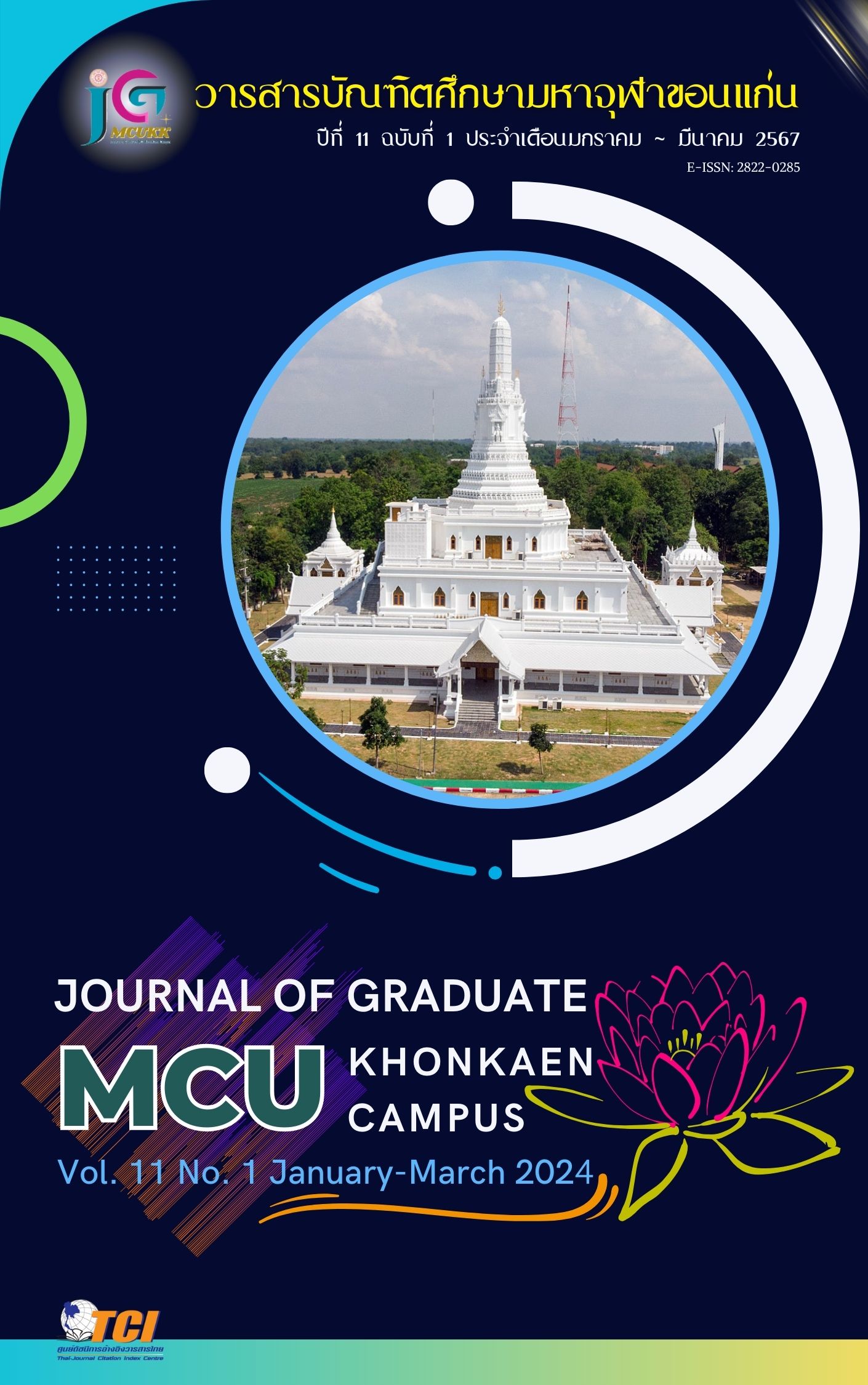The Model of Creating Emotional Well-Being Bases on Theravada Buddhist Philosophy of People in Kalasin Province
Main Article Content
Abstract
The purpose of this research is to 1) Study theoretical concepts regarding emotional health. 2) Study the principles of Theravada Buddhist philosophy regarding emotional health. 3) Create a model for creating emotional well-being according to Theravada Buddhist philosophy. and 4) present knowledge about the model for creating emotional well-being according to Theravada Buddhist philosophy for the people in Kalasin Province. It is mainly a study and analysis of information from the Tripitaka,
textbooks, and related documents. and had in-depth interviews From experts, monks and people from the Tassana Ram Tao Hai Temple community, totaling 25 monks/people, came to analyze the content data and present the information. Descriptive
The research results were as follows:
1. Theoretical concepts regarding emotional health include: 1) Three concepts of emotional health: Wellness according to Adams's concept. Well-being according to Meyer's concept and Buddhist holistic health 2) Theories regarding emotional health include Hare's normative theory. It is a theory of purely moral judgments that have emotional meanings. and C. L. Stevenson's theory of emotionalism is an analytical theory of ethical problem solving.
2. Principles of Theravada Buddhist philosophy regarding emotional health include the principles of yonisommanasikra, principles of mindfulness and awareness. The principles of right view, the principles of concentration, and the principles of wisdom, which are the Dhamma principles that people in Kalasin Province Can be applied to daily life for a better quality of life
3. Models for creating emotional well-being according to Theravada Buddhist philosophy for people in Kalasin Province are 1) Models for creating emotional
well-being according to the principles of Yonisomanasikra 2) Models for creating emotional well-being according to the principles of mindfulness and awareness 3) Rpa. A model for creating emotional well-being based on the principle of right view, 4) a model for creating emotional well-being based on the principle of meditation, and 5) a model for creating emotional well-being based on the principle of wisdom. This is a good guideline for creating the emotional health of the people in Kalasin Province.
4. Knowledge about the model for creating emotional well-being according to Theravada Buddhist philosophy of the people in Kalasin Province is 1) the principle of Yonisomanasikra 2) the principle of mindfulness. Applied to solve the problem of lack of self-control 3) Principle of Right View 4) Principle of Concentration 5) Principle of Wisdom
Article Details

This work is licensed under a Creative Commons Attribution-NonCommercial-NoDerivatives 4.0 International License.
References
กรมสุขภาพจิต. (2561). แผนพัฒนาสุขภาพจิตแห่งชาติ ฉบับที่ 1 (พ.ศ. 2561 - 2580). กองยุทธศาสตร์และแผนงาน กรมสุขภาพจิต กระทรวงสาธารณสุข.
ธนิดา จุลวนิชย์พงษ์ และคณะ. (2562). โครงการการสร้างเสริมคุณภาพชีวิตด้านสุขภาพของบุคลากรทางการศึกษาด้วยโปรแกรมทางจิตใจ อารมณ์และจิตวิญญาณ. (รายงานวิจัย). โครงการวิจัยประเภทงบประมาณเงินรายได้เงินอุดหนุนจากรัฐบาล: มหาวิทยาลัยบูรพา.
พระธรรมปิฎก (ป.อ.ปยุตฺโต). (2552). พุทธธรรม ฉบับปรับปรุงและขยายความ. (พิมพ์ครั้งที่ 8). กรุงเทพฯ: มหาจุฬาลงกรณราชวิทยาลัย.
พระราชบัญญัติหลักประกันสุขภาพแห่งชาติ พุทธศักราช 2545. (2545, 18 พฤศจิกายน). ราชกิจจานุเบกษา เล่ม 119 ตอนที่ 116 ก, หน้า 17.
มหาจุฬาลงกรณราชวิทยาลัย. (2539). พระไตรปิฎกภาษาไทย ฉบับมหาจุฬาลงกรณราชวิทยาลัย. กรุงเทพฯ: มหาจุฬาลงกรณราชวิทยาลัย.
เมธาวี อื้ออารีย์กุล และ กุณฑลทิพย พานิชภักดิ์. (2563). สุขภาวะทางใจของผู้อยู่อาศัยในที่อยู่อาศัย : การทบทวนวรรณกรรมและข้อเสนอแนะ. (รายงานวิจัย). ภาควิชาเคหการ คณะสถาปัตยกรรม ศาสตร์: จุฬาลงกรณ์มหาวิทยาลัย.
รัฐธรรมนูญแห่งราชอาณาจักรไทย พุทธศักราช 2560. (2560, 6 เมษายน). ราชกิจจานุเบกษา เล่ม 134 ตอนที่ 40 ก, หน้า 15.
สมพร เทพสิทธา. (2542). ศาสนากับการพัฒนาคนและสังคม. กรุงเทพฯ: สมชายการพิมพ์.
อัจศรา ประเสริฐสิน, ทัชชา สุริโย และ ปพน ณัฐเมธาวิน. (2561). สุขภาวะของผู้สูงอายุ: แนวคิดและปัจจัยที่เกี่ยวข้อง. วารสารสุขศึกษา, 41(1), 1-15.
Daniel Goleman, (1998). Working with Emotional Intelligence. New York: Bantam Books.

